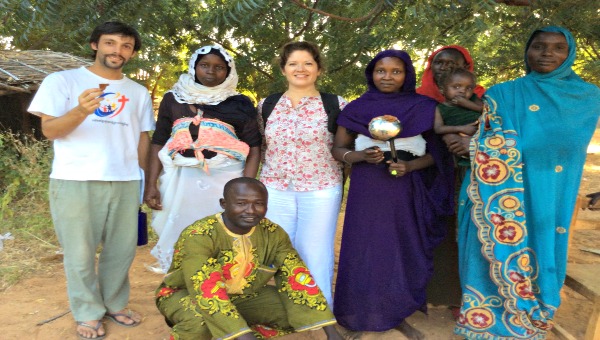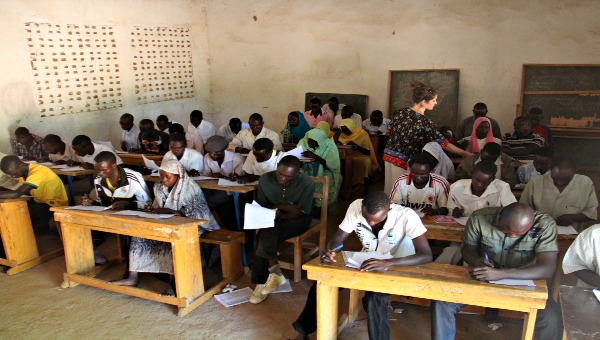

I am lucky to collaborate directly with refugees in Djabal camp, in Eastern Chad, as part of the Jesuit Commons Higher Education at the Margins (JC HEM) programme. We teach English to two classes of adults with the aim of enabling students to eventually pursue an online diploma with a Jesuit University in the US. The majority of these men and women come from Darfur in Sudan and many have been in the camp for over 10 years. Among them are a number of Chadian nationals from the local town. These students help to broaden the perspective of the group and are a daily reminder of the solidarity between the host community and refugees and between Muslim and Christian.
Students engage in two hours community work each week as part of the project to support their respective communities. Their community work projects were chosen following a series of group discussions in class to identify the primary needs of their community and possible ways of responding. Students found there are needs common to both the refugee and Chadian communities relating to literacy, conflict resolution and peaceful coexistence as well as hygiene and health promotion. They reflect on their community work collaboratively in class, exchanging ideas and resources and recording them in a journal. We are hopeful that the friendships formed in this spirit of service, collaboration and justice will be an enduring legacy of this project in addition to the goal of creating future community leaders.
As a JRS staff member, collaboration is formally facilitated at the weekly team meeting where Chadian and international staff report on the activities of the week. The meeting provides an opportunity for all team workers to engage in an exchange of ideas and information and is a new way of working for many. The meeting is carried out in a convivial atmosphere, helped by sweet tea to start and finishing with some roast lamb straight from the market, in the best local tradition!

JRS is responsible for primary and pre-school education for Sudanese refugees in Djabal camp and in Kerfi, a nearby town where refugees are being integrated into the local community. Sudanese and Chadian school principals and inspectors collaborate with JRS project co-ordinators on a day to day basis in the field on questions of curriculum and administration. The transition from the Sudanese curriculum to the Chadian curriculum within refugee camp schools has been a major part of JRS’ work in Chad in the past year including teacher training and the provision of books. Other projects include the education and training of women, the inclusion of children with disabilities and the provision of crèches.
JRS works in partnership with the United Nations High Commissioner for Refugees (UNHCR) and with other NGOs in the day to day mission: sharing facilities; information; extending a helping hand with transport in times of water or fuel shortages. All of the organisations are united in the cause of the refugees and partnership is given priority. Partners meet regularly at the local UNHCR headquarters where issues can be thrashed out and problems shared.
Fr General Adolfo Nicolás SJ reminds us that the Jesuit mission today must always involve three dimensions: ““the service of faith, the promotion of justice and collaboration with others in works of faith and justice”. In a practical way, this project embodies the spirit of the Jesuit mission by engaging the volunteers and beneficiaries alike in a reflective work of service, advocacy and collaboration. Collaboration is central to our mission and takes many forms.
From my own perspective, it’s a privilege to be able to accompany such gentle and resilient people on their daily journey.
Colette Finneran, facilitator of English as a Foreign Language, works with the Jesuit Refugee Services (JRS) in Chad.

